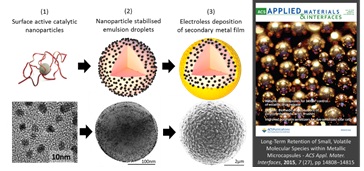
James Hitchcock
University of Leeds, UK
Title: Impermeable metal nano-capsules for drug delivery without side effects
Biography
Biography: James Hitchcock
Abstract
Cancer therapeutics have dramatic side effects on healthy tissues. A prominent research area focuses on encapsulating cytotoxic drugs for targeted delivery to cancer tissues and for reduction of off-tissue side-effects. However, significant challenges remain for encapsulated clinical drugs (e.g. liposomal doxorubicin):
1. Drug encapsulation remains very expensive.
2. Drug loading is low and the manufacturing process is inefficient
3. Once encapsulated drug leaching over time is often high (especially on dilution)
4. Typically release specifically within tumours is not achieved

Schematic diagrams and corresponding electron microscopy images of the different phases: (1) catalytic metal nanoparticle synthesis, (2) nanoparticle stabilization of liquid emulsion droplets and (3) electroless deposition of a continuous, impermeable metal coating. An image of the metal capsules on the front cover of ACS Applied Materials and Interfaces is also included.
Recently, we have demonstrated the efficient manufacture of impermeable metal-shell/liquid core microcapsules (Hitchcock ‘Long-term Retention of Small, Volatile Molecular Species within Metallic Microcapsules’, ACS Appl. Mater. Interfaces, 2015, 7, 14808) that permit localised delivery of active (pharmaceutical) ingredient high doses by triggering release with ultrasound at the target location. This delivery method has the potential to be superior to all previously developed encapsulation strategies because it would address all of the above challenges simultaneously:
1. Capsules can easily be manufactured at industrial scale,
2. High drug content can be achieved within capsule cores,
3. No drug leaching occurs, thus preventing any side-effects prior to release activation via ultrasound treatment,
4. Complete release of high drug concentrations can be achieved in cancer-affected areas only.

